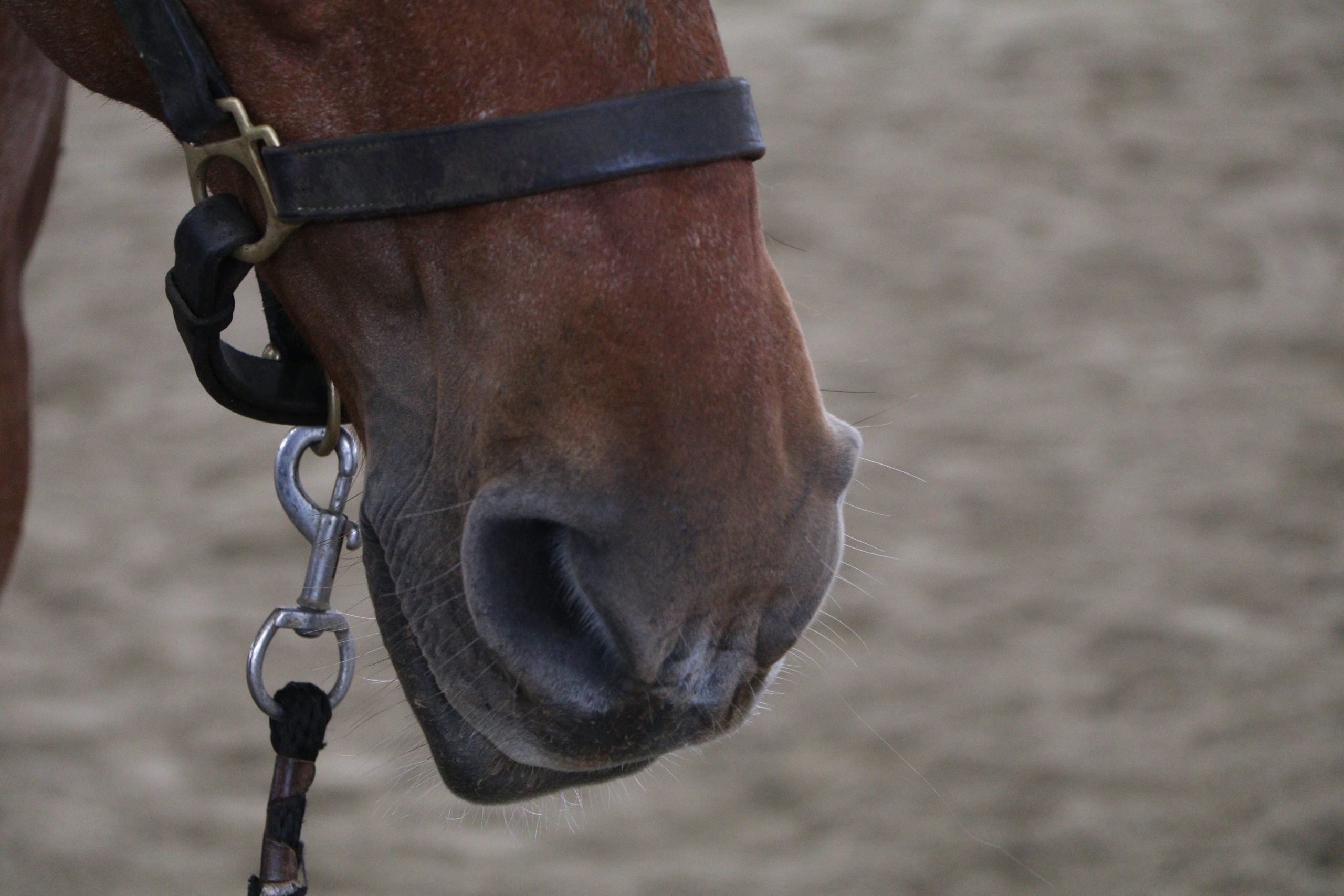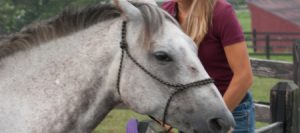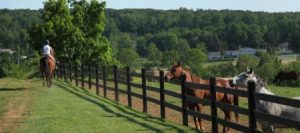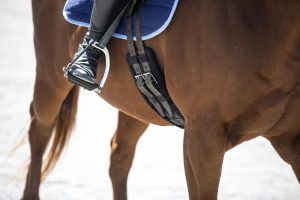Bucking. Rearing. Biting. Spooking. Going Too Fast, Not going forward.
There is one common factor in all of these problems. The problem is tension. Specifically, too much tension.
Yes, the causes of these problems can vary, the horse may have physical pain, he may have had bad experiences in the past, or he may be feeling frustrated or anxious.
However, in each of these problems the horse is tense. It may not always be the kind of tension that is easy to spot – a horse moving warily with head high and tail clamped. Tension can be more subtle, with a clamped lower lip or a wide eye.
Horses are stoic by nature. They are a prey species, and hiding pain and therefore weakness, is key to their survival.
If we don’t learn to recognize and address tension in our horse, we may be caught off guard with behavior that seems unpredictable, but in reality the warning signs were there far in advance.
In the video below, I will show how to recognize subtle signs of tension in your horse.
I would also like to invite you to join me in a Free Online Workshop to discover the connection between your horse’s body and behavior. This workshop is taught by Patrick King and begins March 21!
Now it’s time for a little quiz…
Which images in the picture below show the horses with the most tension in the moment the picture was taken?

Horse number 2 is clearly unhappy – we can see her pinned ears, flared nostrils, and swishing tail. Horse 3 and 4 are both moving similar in that they are hollow and tight in their back, and Horse 3 is quite wide eyed in this moment! Do you have more observations to add? Put them in the comments below!
Resources: Emanuela Dalla Costa, Riccardo Pascuzzo, Matthew C. Leach, Francesca Dai, Dirk Lebelt, Simone Vantini, Michela Minero, 2018 August, Can grimace scales estimate the pain status in horses and mice? A statistical approach to identify a classifier














59 Responses
My horse can get tight and anxious and its usually me so I start first with a few laps super relaxing, not asking for anything until he and I are relaxed, then start.
Love your videos and what you do.
Janine, have you tried some breathing exercises during those warm up laps?
-Julia Burdy, CRK Training Community Manager
great video….have a saddlebred/tennessee walker and she gets choppy with her gait, and I have come to conclusion it’s her confidence level by riding alone. I try to get her through by slowing her, and starting over, talking…always learning
Hi Terri, I would think about encouraging, even if from the ground to start, for her to stretch through her topline and then transferring that to the saddle. I hope you’ll join us in Patrick King’s upcoming workshop, I think many of the exercises presented in there will be key for your and your horse!
-Julia Burdy, CRK Training Community Manager
Horse 2 seems to have tension from annoyance while horse 3 seems to have tension fromexcitement. I’m sure both could be dangerous.
Love this video. This is the kind of stuff I am trying to learn. Thank you!
Interesting observation Dawnte! I would agree on #3, but in fact horse #2 had a long history of back pain and her reaction to the mounting block is tension due to long time back soreness!
-Julia Burdy, CRK Training Community Manager
I always enjoy your insights. Thank you. I’ve been riding most of my life, the other most I’ve wasted. Keep on encouraging tiders no mayter their skill level.
I’m registered on your mailing list but each email asks me to register again to view the Free Video in the email
This is frustrating as I’m not seeing/ learning anything!
Can you advise please?
kennyboy47 @yahoo.com.au
Thank you
Ken
Ken, no need to re-subscribe each month to the blog! All you need to do is click the link in the email and the newest blog will be there waiting for you!
-Julia Burdy, CRK Training Community Manager
I recently completed the Patrick King in hand course, and through particpating in the course I discovered my mare Grace had a sensitive spot across the bridge of her nose. This caused other behaviors to become apparent and it was from tension. Discovering this tension and working through it has been amazing! She has been a different horse and my constant guessing is history… Always look forward to weekly blogs!
Christa
Christa, the in hand work is a fabulous diagnostic tool for finding these places of tension! I’m very happy to hear that Grace is doing much better now!
-Julia Burdy, CRK Training Community Manager
I have been riding for many years and learned so much about tension in the past 8 months. My current horse is very opinionated and sensitive. She came from not such a good situation and I am retraining her. I learned a lot about my own tension and how it influences her.
What I like to do is take my time with everything I do with her. It starts with the grooming. There I can already check for tense spots like muscle twitching, move head towards where I am brushing and her facial expression look tense (the ones you mentioned), tail swishing is another good sign for discomfort/tension. I try to remove tension in her body using Masterson method. Working from the ground is another way to see tension and find ways how to help your horse to remove it and feel more comfortable. I use breathing techniques for myself. This is a working progress and we both learn how to leave our tension at the door and what the two us can do to help each other.
Claudia, it sounds like you are definitely taking the time to work through her tension. Do you know the specifics of her background?
-Julia Burdy, CRK Training Community Manager
We have a mare that displays several of these signs of tension (ears usually back – but not “pinned back”, flared nostrils, and wide eyed are mainly her 3. I always talk to her and love on her before taking her from her stall to the pasture, to groom/ride, or during the farrier, etc and do not recall her always being like this. We have not changed her diet, interaction with other horses, or with us (only two of us work with her vs multiple riders), location, etc so not sure why she continues to display so much tension? Overall she seems very healthy. Have actually considered trying a calming supplement advertised like “moody mare supplement”, or “calming supplement” but have never used any of these before and wondering what your thought is on such a supplement? She is a strong horse and a very sweet horse but always on guard with her “moods”.
Melissa, the problem with supplements like that is they are not regulated so we don’t actually know what is in them so you could be giving something that doesn’t actually have any benefit to the horse! Has her saddle fit been evaluated? Does she get plenty of turnout? How much of grain versus forage is in her diet?
-Julia Burdy, CRK Training Community Manager
Thank Callie. I really enjoy your videos and emails.
I noticed an unhappy body language in my horse the day after his vaccinations. He was avoiding my touch, turning his head away, and had a tight mouth (lips pressed together.) It turns out he was sore from the shots and not feeling well in general. He was still a little stiff on the next day, but responded well to walking and grazing with me. He seemed to be more like himself when I put him away. I can’t wait to see how he is tomorrow. I am very glad I asked his trainer to give him a couple of days off!
Debbie, great points you brought up here! Horses definitely can get sensitive after their annual vaccines so depending on their reaction a few days off may not be a bad idea
-Julia Burdy, CRK Training Community Manager
Hi, I could be wrong but in picture No. 1 the horse looks very disengaged and like it has given up. The horse in picture No. 5 to me looks the same with the drooping head. Good video and really good advice.
Interesting observations Denise! It helps that I know the context of the photos #1 I believe is actually pretty relaxed, just very tired after a ride! #5 is a young horse that is learning to find relaxation, which he struggles with and will toggle often between relaxation and tension.
#1 I believe is actually pretty relaxed, just very tired after a ride! #5 is a young horse that is learning to find relaxation, which he struggles with and will toggle often between relaxation and tension.
-Julia Burdy, CRK Training Community Manager
Having ridden for a lot of years I am so grateful for your insights. I have keenly observed my horses over the years, but you are pulling it all together and making a lot of sense. Thank you for your help
Cara, happy to hear you enjoyed the video
-Julia Burdy, CRK Training Community Manager
Wow! needed this one right now, Callie. Thank you so much. Very helpful
Tammy, glad this video came at a good time for you
-Julia Burdy, CRK Training Community Manager
I so appreciate your insights into better understanding horses and sharing that knowledge with us. I look forward to applying these nuggets of truth and working with my horse. Thank you Kelly!
I have only been taking riding lessons for six months but I have noticed the horse is sometimes a little more tense at the start but when we get going well she relaxes I talk to her sometimes and she seems to respond to praise or firmness in my voice. So much to learn yet, but your videos help, and I am loving the learning!
Sarah, great observations! That very well could be the case, she could be a bit uncomfortable with you and the environment to begin and then settles in
-Julia Burdy, CRK Training Community Manager
I wouldn’t necessarily consider #3 “tense” – at least not in a “bad” way – Given the context, could easily just be a young horse in a “yahoo” mood playful and ready for a little “rough and tumble” with its mates. “Tense” is when you have a raccoon “invading” your ring and your normally “phlegmatic” pony is totally focused on where the raccoon is, feeling ready to “get out of Dodge” at any moment and not at all paying any attention to you the rider.
Jeanne, your insight is so valuable! He could have been just exuberant but if you look closely at his eyes there is a sense of tension and worry there that I think differentiates between excitement and exuberance!
-Julia Burdy, CRK Training Community Manager
Thanks for the great info! My horse pulls back his bottom lip into almost a grimace when he is tense. Also, his tail. On occasion, when he is irritated, he can whip me with it while I’m in the saddle.
Amarena, it sounds like your horse holds a heavy amount of tension. Have you palpated his back for any soreness? It sounds like he may be pretty uncomfortable somewhere in his body…
-Julia Burdy, CRK Training Community Manager
Callie, thank you so much for all that you do for us newbies! This information is really great and at a much needed time for me. I would swear my horse is Claustrophobic … totally nervous in the barn ! Horse #2 looks really nervous/upset and I don’t think I would mount him at that moment .
Wendy, absolutely horses can be claustrophobic. Is it only when he is in the barn or have you noticed him nervous in other environments as well? It may also be that he is maybe as some stall anxiety?
-Julia Burdy, CRK Training Community Manager
Enjoyed this video and insights. I continue to work on being better about recognizing the subtle signs of tension, Thanks Callie!
I also learned to observe how they are standing. They should be standing square all four feet even, but if one leg is in front of the other they are not relaxed and in more of a “ready to run” position.
Diana, although their posture can definitely be telling of tension horses will often not stand square also due to movement patterns. For example, we actually as humans have similar patterns, we’ll put more weight on one leg than the other or stand with one foot slightly in front of the other!
-Julia Burdy, CRK Training Community Manager
Yes, it seems I have one leg slightly shorter (causing pain in glut) and right foot usually in front, but now I’ve a small heel lift I stand square, and pain has vanished!
My horse has a habit that I think is from anxiety. When I go to tack he will tilt his head and lick the corner of his mouth intensely. I first noticed it after using a full cheek snaffle. This is a very intense movement not just slight. How can I break him of this?
Joann, before thinking of how you can ‘break’ the habit I would have his teeth checked by a veterinarian. Is the full-cheek snaffle the only one you’ve used with him? Once you rule out physical problems I would recommend using some clicker training, so when he puts his head straight and doesn’t do that use the marker signal of a click and give him a positive reinforcement reward.
-Julia Burdy, CRK Training Community Manager
Thank you so very much for all the sharing of your horse knowledge. You are a wonderful teacher and explain things so wonderfully that even someone like myself who has NEVER been around horses can learn from. On the farm where I’ve been volunteering, we have a horse, Lucky, who is recovering from a broken pelvis (happened 3 weeks ago). He has been pretty much stall-bound. I go by to see him 2 to 3 times a week and with each visit I learn more and more about him and can recognize what kind of mood he is in or if it’s been a good day with less pain. I’ve been learning so much from your videos on how to recognize important cues on how any of the given 7 horses at the farm are feeling about me or their environment. Thank you so much for all your dedication on teaching us how to be better horses people!!!
Deborah, I hope lucky has a speedy healing journey! If the barn owners allow I’m sure he would love to have some interaction with maybe some clicker training!
-Julia Burdy, CRK Training Community Manager
These blogs are always so timely & informative! Thank you! I have a 17 year old arab that is a great little horse.. but she is at a barn where they have riding program for at risk kids.. so there is always alot of activity. Which causes tension in her.. but honestly the activity creates tension in me waiting for her response to it! So Iam learning how much of my behavior affects her. I am learning that I hold a lot of tension & worry.. she is so sensitive to it! Thank you so much for your blogs.. as a new horse owner it has been great having your blogs as a resource!
Julie, glad to hear this video was a good resource for you! That level of activity (as long as it is safe to handle your horse) will get her used to a variety of commotions!
-Julia Burdy, CRK Training Community Manager
Thank you for this topic. I always enjoy all of your videos. I have a 15 year old gelding who’s personality changed from a calm horse to a very tense one recently. I moved him and thought it was just him adjusting. I finally had his vet give him a complete exam. We discovered he has ulcers and he is now on medicine for them. He is doing better. Recognizing tension is very important.
Rebecca, glad to hear you have figured out what was causing the behavior change. I hope he’s feeling better soon!
-Julia Burdy, CRK Training Community Manager
I know my horse is about to send me to ICU when he lifts his head and his ears are pointed severely forward.
How do I know this??
He has sent me to ICU 2 times. I am now joking. I have the hospital bills to confirm it.
Genevieve McGregor
Denton TX
Genevieve, I am very sorry to hear about your accident….I hope you had a speedy recovery.
-Julia Burdy, CRK Training Community Manager
Callie, I do enjoy how you present thoughts, so much I have learned through experience. Currently, I groom many horses and tack them, so I have become more aware of little things when I am around them. It is different than being around your own horses all the time, it makes you stay more on alert to avoid injuries, but I also want to encourage the horses to relax and trust me. When I groom the horses, I like to always keep one hand on them as I brush them, so I help calm them, but also be aware of anything unexpected. I have been around horses for many, many years and constantly learning and loving every minute. I truly enjoy and learn from your presentations, you use excellent words. Thank you
Nancy, simply spending time around horses is great for learning to recognize tension!
-Julia Burdy, CRK Training Community Manager
Do you believe in such a thing as a “cold back” Julia? My Appie boy just always does this humpy thing for just the first few minutes. I do some hip over, back up and shoulder over in hand stuff before getting on and mostly this stops it but occasionally he still seems “grumpy” for a few minutes.
Jan, I’m not sure I think it depends on the situation. I’ve personally never had experience with a horse that has an properly fitting saddle really feeling ‘cold backed’ I have noticed that certain horses seem to need some time for their backs to warm up and to be able to stretch and open up their stride. Have you had the saddle fit evaluated?
-Julia Burdy, CRK Training Community Manager
Hi . General holds his head really high and hollows his back when tense. I am trying to work on my own anxiety because I’m sure he feeds off it. In the photos the most tense woul be 2 or 3 I believe
Hi Susan, have you participated in our Free In Hand Workshop with Patrick King? It sounds like he could really benefit from the work shared in that series!
-Julia Burdy, CRK Training Community Manager
Hi. Thank you so much for your great videos. I have a QH mare. I’ve owner her for a few months now. When i’m about to get on, she rears her left back leg. Once i’m on her, she doesn’t want to walk at all. She wants to go straight into a trot. I thought it was her saddle that didn’t fit properly. Just bought a new saddle, that fits her perfectly, and she still does it. Any suggestions?
Lisa, does she only do this when you are riding? Do you notice the behavior other times? Has she always done this since you bought her?
-Julia Burdy, CRK Training Community Manager
Hi Callie,
On April 1/2019 I was riding my daughters horse and she went into a full gallop from a trot. I was thrown off and was seriously injured. I have been riding for 4 years so not a seasoned rider but one thing I did notice was, that when my daughter was riding her horse before I rode she was not happy about being on the bit I could tell she was stressed. I know now that the signs were there and I should have ridden her another day.
Your video really helped me see things clearly!
Jill, unfortunately hindsight is 20/20…at least you’ll have this knowledge going forward. I hope you weren’t injured in your fall.
-Julia Burdy, CRK Training Community Manager
I purchased an 8 yr old paint grade quarter horse mare 4 mo ago. I was told the previous owner used her for a therapy horse for their son. I knew that wasn’t the true story when I rode her for the first time!!! It’s been several years since I’ve owned a horse. I used to show in Western pleasure and barrel race. I bought her for pleasure/trail riding. She gets VERY anxious when she is by herself (tears up stall trying to escape). She has reared up and fallen with me on her a couple of times (bruising for me and a fatality for my cell phone!) And this was from me trying to move her forward (the first time) and trying to redirect her (the second time). She does mostly ok when I ride with another rider. Any suggestions?!
Charlotte, first of all, the number one thing to keep in mind is your safety! First, I would try to figure out what changed between when the previous owner had her and how she is managed now. Does she still get ample turnout? Has her diet changed? Does she have a ‘healthy’ social life where she gets to interact with other horses?
-Julia Burdy, CRK Training Community Manager